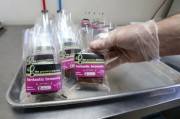A Boulder company that manufactures cannabis-infused edibles has voluntarily initiated a state-wide recall on one of its products because of “a lack of temperature control during the manufacturing and distribution processes,” according to Denver’s Department of Environmental Health.
No illnesses have been attributed to the recall, the city confirmed.
More pot business news
Another edibles recall: At Home Baked’s use of washing machine for hash questioned
Politicians, take note: “The word is out that the pot industry has money to give”
Ganja Joy no more: Colorado edibles firm settles suit over Hershey look-alikes
Special report: 15 months in, edibles safety still concern for Colorado
NEW: Get podcasts of The Cannabist Show.
Subscribe to our newsletter here.
Watch The Cannabist Show.
The marijuana company, the Growing Kitchen, is recalling a breath spray product known as MaryMint Tincture after a Denver health inspector saw the product on the shelf of one of the city’s marijuana stores. The Growing Kitchen is asking stores and customers to destroy any remaining products, a number the edibles company estimates at around 60 packages.
“It came down to a technicality over refrigeration laws,” said Brooke Wise, co-owner of the Growing Kitchen. The number of recalled items is relatively small because “we knew we were about to shift the packaging,” Wise said.
The Denver health inspector saw the tincture on a shelf, and not in a refrigerator, and questioned its room-temperature oil content’s risk of developing the dangerous clostridium botulinum — “the bacteria that forms the toxin that forms botulism,” said Danica Lee, food safety section manager at the Department of Environmental Health. “It’s rare, but because it’s something that kills people we take it seriously.”

The Growing Kitchen was quick to respond to the health department’s concerns, Lee said: “They’ve really impressed me. They initiated a recall proactively before I had to utter the word to them, which is really impressive.”
The health department and the edibles company discussed several options for the product’s future, and now the Growing Kitchen is changing its standard operating procedures to make its tincture with local honey instead of vegetable glycerin. The company expects to have the new product on pot shop shelves — with a longer shelf-life, thanks to the honey, and the new packaging as originally planned — next week.
“It never feels good to have to swap out products,” said Wise. “You always want to feel good about the product you put out … But now that we’re using our own honey from our own bees on our own farm, it can be shelf-stable and for a longer period of time.”
